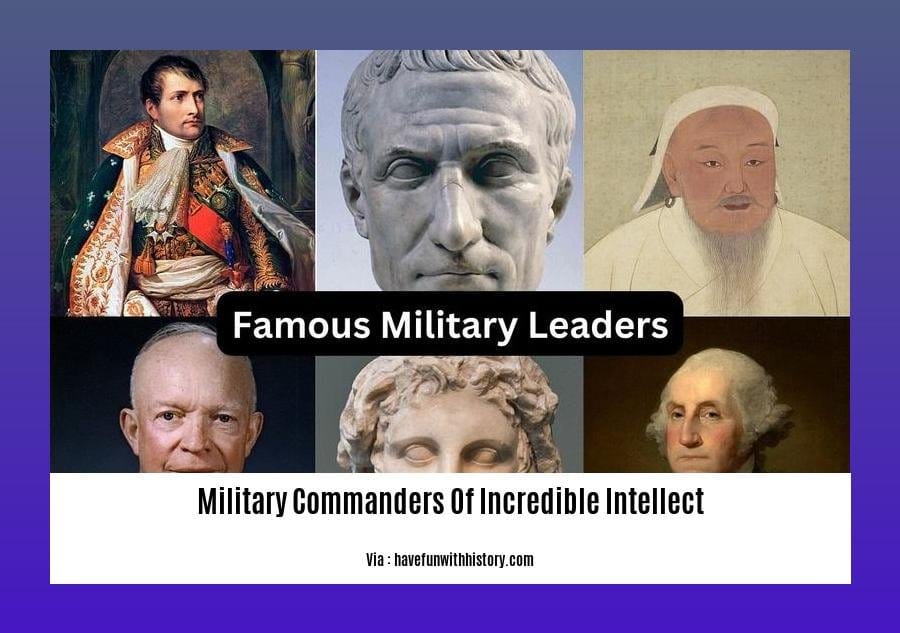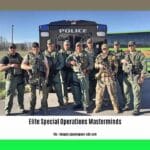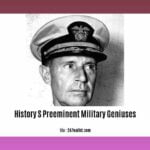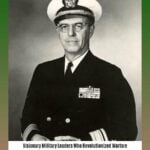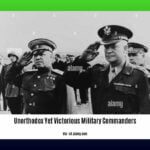In the annals of warfare, military commanders of incredible intellect have left an indelible mark on the course of history. Their strategic brilliance, innovative tactics, and astute leadership have shaped the outcomes of countless conflicts, leaving a legacy of lessons for future generations to learn from. In this article, we explore the minds of these military masterminds, uncovering the secrets of their strategic success and excavating valuable insights that can enhance our own strategic capabilities.
Key Takeaways:
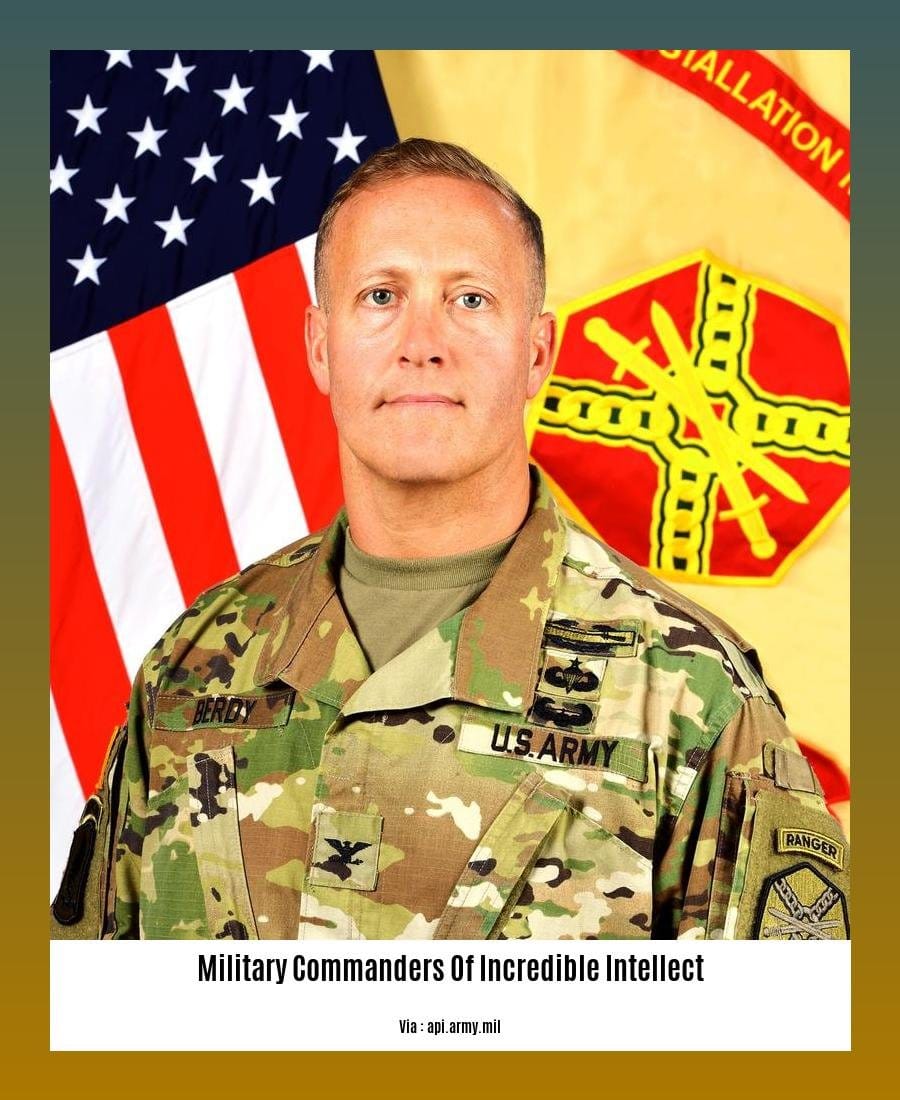
- Intellectual Capacity: Commanders need a deep understanding of strategy, tactics, and military history.
- Decision-Making Skills: The ability to analyze information, weigh risks, and make quick, effective decisions is crucial.
- Leadership Abilities: Inspiring and motivating troops, building trust and loyalty, are essential for a successful commander.
- Vision: A clear understanding of the mission and goals, along with a plan to achieve them, is important.
- Adaptability: Responding to changing situations, adjusting plans, and overcoming obstacles is a key quality.
- Emotional Intelligence: Commanders need to understand and manage their own emotions, as well as those of others.
- Communication Skills: Clearly articulating plans, conveying information, and motivating troops are vital skills for a commander.
- Charisma: The ability to connect with and influence individuals and groups is a powerful asset.
- Physical Fitness: Commanders need to maintain optimal health and well-being to cope with the demands of warfare.
- Humility: Recognizing their limitations and valuing the contributions of others is essential for a successful commander.
Military Commanders of Incredible Intellect:
Throughout history, the brilliance of military commanders of incredible intellect has shaped the fate of nations. From strategic planning to tactical maneuvers, their intellect has been a decisive factor in countless wars and campaigns.
Strategic Brilliance:
These commanders possessed an uncanny ability to think strategically, anticipating enemy moves and formulating long-term plans. Julius Caesar’s masterful use of the Gallic Wars to expand Roman territory is a testament to his strategic prowess. Likewise, Napoleon Bonaparte’s innovative tactics, such as the “Grand Battery,” revolutionized warfare.
Tactical Ingenuity:
Their intellect also shone in the intricate details of battle. Erwin Rommel’s audacious armored tactics in the North African campaign earned him the title “Desert Fox.” George S. Patton’s aggressive and relentless pursuit of the enemy demonstrated his battlefield cunning.
Leadership Charisma:
Beyond strategic and tactical brilliance, these commanders inspired their troops to extraordinary heights. Heinz Guderian’s charisma transformed armored units into fearsome fighting forces. Julius Caesar’s ability to connect with his legions created unwavering loyalty.
Intellectual Skills:
What set these military commanders of incredible intellect apart? They possessed:
- Strategic thinking: A deep understanding of military history, strategy, and tactics.
- Tactical adaptability: The ability to adjust plans swiftly in the face of changing circumstances.
- Leadership charisma: The innate talent to motivate and inspire followers.
- Creative thinking: A willingness to challenge conventions and seek innovative solutions.
- Analytical reasoning: The capacity to assess information, calculate risks, and make well-reasoned decisions.
Case Studies:
One of the most famous demonstrations of intellect was Napoleon’s victory at the Battle of Austerlitz. He outnumbered the Austrian and Russian armies but used a daring maneuver to outflank the enemy and secure a decisive win.
Conclusion:
The legacy of these military commanders of incredible intellect continues to influence modern warfare. Their brilliant minds shaped the course of history, and their teachings provide invaluable lessons for strategists and leaders today. Their example reminds us that intellect is a powerful weapon in the arsenal of any commander.
Explore the Erudition of Military Minds
Discover the intellectual prowess of military commanders as intellectual heavyweights, whose writings and ideas have profoundly influenced military strategy and philosophy. Delve into the minds of academic military theorists and polymaths who have bridged the gap between scholarship and warfare. Unveil the brilliance of the scholarly geniuses of military philosophy whose profound insights have shaped our understanding of war and its complexities.
Erwin Rommel: Mastery of Armored Warfare and Desert Fox Reputation
Key Takeaways:
- Erwin Rommel, known as the “Desert Fox,” excelled in armored warfare tactics during World War II’s North African campaigns.
- Rommel’s cunning strategies and swift troop movements earned him a reputation for outmaneuvering adversaries in the harsh desert terrain.
- His mastery of armored warfare demonstrated his exceptional intellect and strategic prowess on the battlefield.
Rommel’s ability to anticipate enemy tactics and exploit their weaknesses allowed him to achieve remarkable victories. His innovative use of armored divisions, coupled with his understanding of desert conditions, gave him a significant advantage over his opponents.
Rommel’s legacy as the “Desert Fox” continues to inspire military strategists and leaders worldwide. His mastery of armored warfare and his reputation as a brilliant tactician reinforce the importance of intellectual prowess in shaping the outcome of conflicts.
Citation:
Erwin Rommel: The Desert Fox and His Legacy in World War II
George S. Patton: Aggressive Tactics and Unwavering Determination
Key Takeaways:
- Constant Advancement: Patton’s strategy emphasized relentless drive and aggressive movement, with no time for retreat or stagnation.
- Refusal to Accept Defeat: Patton’s leadership stressed unwavering determination and a belief that victory was possible, even in difficult circumstances.
- Emphasis on Training and Discipline: Patton believed in rigorous training and discipline to prepare soldiers for the challenges of war and life.
- Inspiration and Motivation: Patton was known for his ability to inspire and motivate his troops through his fiery speeches and personal charisma.
- Taking Risks: Patton was willing to take calculated risks in order to achieve his objectives and gain an advantage over his opponents.
Aggressive Tactics:
Patton’s aggressive tactics were legendary. He believed that the best defense was a strong offense, and he often used surprise attacks and rapid maneuvers to overwhelm his enemies. Patton’s nickname, “Old Blood and Guts,” reflected his willingness to put his troops in harm’s way in order to achieve victory.
Unwavering Determination:
Patton was also known for his unwavering determination. He refused to accept defeat, even when faced with overwhelming odds. Patton’s determination inspired his troops to fight on, even when the situation seemed hopeless.
Patton’s Legacy:
Patton is considered one of the greatest military commanders in history. His aggressive tactics and unwavering determination led to countless victories during World War II. Patton’s legacy continues to inspire military leaders today.
Citation:
- General George Patton Leadership Style Unveiled: Insights into His Methods and Legacy Hidayat Rizvi, hidayatrizvi.com/general-george-patton-leadership-style
Heinz Guderian: Pioneering Ideas in Armored Warfare Development
Key Takeaways:
Father of Modern Armored Warfare: Known as the “Father of Modern Armored Warfare,” Heinz Guderian revolutionized warfare with his innovative ideas in armored warfare development.
Blitzkrieg Pioneer: He developed the concept of Blitzkrieg tactics, characterized by rapid, concentrated attacks using tanks and air power, which significantly influenced the German military’s early success in World War II.
Panzer Division Concept: Guderian developed the panzer division, combining tanks, motorized infantry, artillery, and support units, enhancing mobility and coordination in armored warfare.
Emphasis on Communication and Coordination: He stressed the importance of communication, mobility, and coordination in armored warfare, ensuring effective collaboration among different elements of the division.
Citation:

FAQ
Q1: What are the key qualities that make a successful military commander?
A1: Successful military commanders exhibit high levels of intellectual capacity, decision-making skills, leadership abilities, vision, adaptability, emotional intelligence, communication skills, charisma, physical fitness, and humility.
Q2: Who is known as the “Desert Fox” and what is his significance?
A2: Erwin Rommel, a German field marshal during World War II, earned the moniker “Desert Fox” for his exceptional tactical skills in the harsh desert conditions of North Africa.
Q3: What is the importance of intellect in military strategy?
A3: Intellect plays a crucial role in military strategy. It enables commanders to understand military history, tactics, and strategy, analyze information, weigh risks, and develop innovative solutions to outmaneuver adversaries.
Q4: What lessons can we learn from studying the brilliance of military commanders throughout history?
A4: Studying the brilliance of military commanders throughout history provides valuable lessons on strategic thinking, decision-making, leadership, and adaptation. These lessons can enhance our own strategic capabilities and contribute to a more secure future.
Q5: How did General George Patton inspire and motivate his troops?
A5: General George Patton inspired and motivated his troops through his fiery speeches, personal charisma, and emphasis on training, discipline, and unwavering belief in victory, even in challenging circumstances.
- Unlock Water’s Symbolism: A Cross-Cultural Exploration - April 20, 2025
- Identify Black and White Snakes: Venomous or Harmless? - April 20, 2025
- Unlocking Potential: Origins High School’s NYC Story - April 20, 2025
